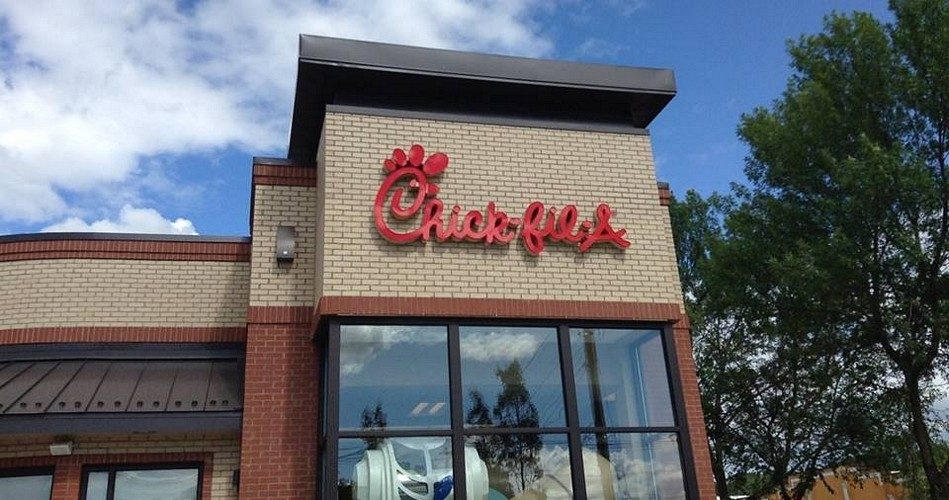
As Chick-fil-A continues to explode in popularity across America, LGBTQ malcontents refuse to throw in the towel on their dismally failed campaign to destroy the successful fast-food restaurant chain.
The latest attempt has popped up at the University of Kansas (KU), where a small faction of angry faculty are demanding that the school evict Chick-fil-A from its prominent place on campus, and not to renew its contract with the chain. As reported by the Kansas City Star, the KU faculty, in supposed defense of LGBTQ people on campus, “are denouncing the school’s new relationship with Chick-fil-A restaurant chain and calling for a boycott.”
According to the Star, “Chick-fil-A had operated out of the basement of KU’s Wescoe Hall for 15 years, but this school year moved up to a prominent spot in the student union. In addition, the restaurant secured a sponsorship — the newly created ‘Chick-fil-A Coin Toss’ at the start of every Jayhawks home football game for the next several years.”
In an angry open letter targeting KU chancellor Doug Girod, the KU provost office, and the athletic department, a group styling itself as KU’s “Sexuality and Gender Diversity Faculty and Staff Council,” called Chick-fil-A a “bastion of bigotry,” and castigated the university for giving the fast-food chain “a prime retail location in the heart of our campus,” and for allowing it to participate in campus activities.
Repeating talking points used in the past by homosexual activist groups such as the Human Rights Campaign (HRC), the faculty group charged that Chick-fil-A is steeped in a “history of supporting organizations that are hostile to lesbian, gay, bisexual, transgender, and queer people, families, and communities.” The group claimed that the “culture of Chick-fil-A fosters hate and discrimination on multiple levels,” and insisted that its presence on campus “stands in direct contrast to the university’s mission of fostering a multicultural, inclusive environment.”
The group complained that “moving Chick-fil-A to the Union and granting it a role at the start of all home football games violates the feelings of safety and inclusion that so many of us have striven to create, foster, and protect on campus, and sends a message that the Union, KU Athletics, and the administration at large are more concerned about money and corporate sponsorship than the physical, emotional, and mental well being of marginalized and LGBTQ people.”
While acknowledging that contractual obligations make it impossible for the university to evict Chick-fil-A immediately from the campus, the LGBTQ faculty group demanded “a guarantee from the Chancellor, KU Athletics, and the Provost that these contracts will not be renewed once expired.”
For their part, the discontented faculty group promised that it would “urge our members and allies to speak with our dollars as well as our words, and boycott” the KU Chick-fil-A restaurant.
The unsuccessful campaign by homosexual and LGBTQ activists to destroy Chick-fil-A goes back to at 2012, when the chain’s CEO, Dan Cathy, said during a radio interview that neither he nor the chain supported same-sex marriage. “I think we are inviting God’s judgment on our nation when we shake our fist at Him and say, ‘We know better than you as to what constitutes a marriage,’” Cathy said at the time. “We are very much supportive of … the biblical definition of the family unit. We are a family-owned business, a family-led business, and we are married to our first wives.”
That statement prompted individuals and groups committed to the LGBTQ agenda to aggressively oppose the opening of Chick-fil-A restaurants in cities such as Denver, Boston, Chicago, and San Antonio. Nonetheless, the campaign has been fruitless, as earlier this year Chick-fil-A was named the third-largest restaurant chain in the United States. According to top business analyst Mark Kalinowski, Chick-fil-A’s 2018 sales have taken it from the No. 7 spot in 2017 to the cusp of No. 3, trailing only McDonald’s and Starbucks, and besting fast-food favorites Taco Bell, Subway, and Burger King.
In fact, a recent analysis by Goldman Sachs found that the average Chick-fil-A restaurant generates more than double the revenue of the average McDonald’s restaurant — despite the chicken chain’s closed-on-Sunday policy. “Our brand survey shows that Chick-fil-A has had the most brand momentum across [fast-food chains], supporting the most increase in total revenue (in dollar terms) in the US,” noted the Goldman Sachs analysis. The report added that a “2,000-consumer brand survey suggests [Chick-fil-A] will continue to take share and grow.”
Some observers have suggested that the company’s popularity and success may be tied in part to its Christian values. Chick-fil-A says that its official corporate purpose is “to glorify God by being a faithful steward of all that is entrusted to us and to have a positive influence on all who come into contact with Chick-fil-A.”
Townhall.com noted that Chick-Fil-A founder Truett Cathy “was a devout Christian who believed in traditional marriage. Every employee is trained in line with Christian teaching. The alleged culture of hate the [KU] professors accuse the sandwich chain of creating includes employees who change customer’s tires in the drive-thru lane, feed disabled customers, and always say ‘My pleasure’ when a patron says ‘Thank you.’”
Image: flickr.com / Mike Mozart


